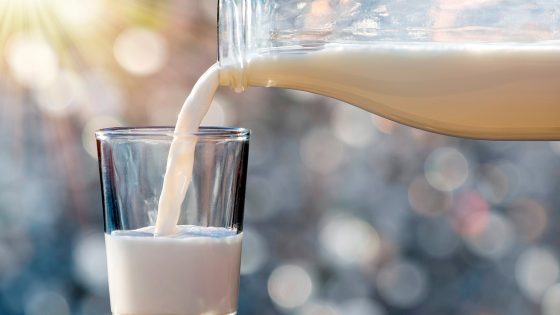As federal agencies and state partners continue investigating outbreaks of highly pathogenic avian influenza (HPAI) — more commonly referred to as bird flu — the U.S. Food and Drug Administration says it discovered fragments of the virus in some samples of milk.
In an update from the FDA, the agency said it tested milk samples by polymerase chain reaction (PCR) and found the presence of fragments of the virus, which is not the same as infectious virus and currently poses no increased risk to human health.
“Based on available information, pasteurization is likely to inactivate the virus, however the process is not expected to remove the presence of viral particles,” the FDA said.
Milk is seen in an undated stock photo.
STOCK PHOTO/Getty Images
“At this point, when you look for something in public health, science and medicine, your chances of finding it go up,” ABC News chief medical correspondent Dr. Jennifer Ashton said.
Citing a senior official at the Centers for Disease Control and Prevention, Ashton said, “the overall risk to the general American population is low, particularly from dairy cows, however, ‘they are taking this very seriously.'”
What to know about bird flu and safety of milk supply
Importantly, the FDA stated, “we have seen nothing that would change our assessment that the commercial milk supply is safe” and expect new results from multiple studies “in the next few days to weeks.”
Concerns were first raised last month when HPAI was detected in dairy cows across multiple states, but the USDA and FDA maintain that the U.S. commercial milk supply remains safe due to “the pasteurization process and the diversion or destruction of milk from sick cows.”

Holstein dairy cows at a dairy farm in Crestwood, Ky., Sept. 27, 2021.
Luke Sharrett/Bloomberg via Getty Images, FILE
“Nearly all (99%) of the commercial milk supply that is produced on dairy farms in the U.S. comes from farms that participate in the Grade ‘A’ milk program and follow the Pasteurized Milk Ordinance (PMO), which includes controls that help ensure the safety of dairy products,” the FDA update continued.
Aside from pasteurized milk, both the FDA and CDC warn against drinking raw milk or products made with it that are typically bought at farms or local stores, due to possible viruses or bacteria that can lead to infection or foodborne illness.
Twenty states explicitly prohibit raw milk sales in some form. And milk that travels across state lines must be pasteurized, according to federal regulations.
HPAI was first detected in 1996 and there have only been two cases of human H5N1 in the U.S. so far. There have been no reports of human-to-human spread in the U.S.
Source Agencies


